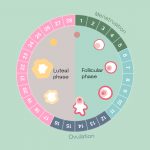How to Naturally Lengthen Your Luteal Phase
When you think about conceiving, ovulation is probably the first thing that comes to mind. But ovulation is only one part of the process. Your Luteal Phase is the second part, and is just as important as ovulation. The luteal phase is the post-ovulation phase of your cycle.

After your egg has been released, your body releases progesterone and thickens the lining of the uterus to prepare for pregnancy.
This process is 12-14 days long, or roughly two weeks. In a cycle that’s on average 28 days long, 14 days is typically the norm.
A Luteal Phase less than 11 days consistently could pose an issue with conceiving or maintaining a healthy pregnancy.
What is a luteal phase defect?
A luteal phase defect is defined as having low levels of progesterone during the luteal phase. These low levels ultimately lower progesterone, making it difficult to sustain a pregnancy.
In a study, 18% of women were noted to have a short luteal phase, overall it was determined that a short luteal phase can affect fertility, but only 3% of women suffer from recurring short luteal phases.
How do I know if my luteal phase is short?
Typically if your luteal phase is 11 days or less, you may have a luteal phase defect. But having your doctor perform tests to check your luteal phase is the most accurate way to know (you can also calculate it yourself). Charting your cycles will also determine whether or not your short luteal phases are reoccurring.
The Mira Fertility Starter Kit makes tracking your cycles easy and effortless with our system that measures your hormone levels and gives you personalized fertility insights.
Your doctor may perform a series of blood tests to check your hormones, some of the tests include Progesterone, Luteinizing Hormone, and Follicle-stimulating hormone known as FSH.
Some doctors may have a hard time diagnosing someone with a luteal phase defect.
However, there are a few symptoms that are reported with LPD.
Symptoms you may experience with a short luteal phase defect include:
- Several early miscarriages
- Short menstrual cycles
- Spotting in between ovulation and period
In women with short luteal phases, these symptoms are the result of low levels of progesterone.
Why do I have a short luteal phase?
Typically a short luteal phase is caused by not producing enough progesterone. Some health problems can also play a part in a short luteal phase, health issues such as:
- Anorexia
- Obesity
- Polycystic ovary syndrome (PCOS)
- Excessive exercise
- Stress
- In a study, short luteal phases were observed in women that were smokers. Smoking can shorten the luteal phases due to the effects of reducing your estrogen levels.
How do I fix my short luteal phase?
Treating a short luteal phase depends on the underlying cause. In some cases, a doctor may prescribe human chorionic gonadotropin(HCG) supplements to help produce more progesterone, which may help improve the chances of becoming pregnant.
Your doctor may also prescribe progesterone if they suspect it is necessary. Progesterone can be taken through suppositories, injections, orally.
But the side effects of artificial progesterone can be undesirable. Some have reported the effects of abdominal cramps, headache, bloating, anxiety, nausea, fatigue, and diarrhea. These side effects can lead women to choose other options that have fewer side effects.
Can I increase my luteal phase naturally?
There are quite a few options to consider when trying to naturally lengthen your luteal phase. Changing your diet, vitamin intake, reducing stress, herbal supplements, and essential oil are some of the more popular methods some choose.
Vitamin C is a way to naturally strengthen your luteal phase and thicken the uterine lining. Some studies have shown Vitamin C also increases progesterone levels. Drinking orange juice or taking vitamin C supplements can help add extra Vitamin C to your diet. There are also foods that are high in vitamin C which we will discuss in the next section.
Diet can play a role in lengthening your luteal phase. Choosing foods that are high in Vitamin C helps to increase your luteal phase. Foods that can help lengthen your luteal phase include:
- Leafy greens
- Carrots
- Sweet potatoes
- Pineapple
- Broccoli
- Strawberry
- Oranges
- Blackberries
- Plums
- Red peppers
- Celery
- Kale
- Salmon
Websites like the Glowing Fridge and YourCycleYourFood have smoothie recipes for each part of your cycle, including your luteal phase, helping you get the right fruits and vegetables through each part of your cycle.
Herbal Supplements like Vitex are often brought up when it comes to natural ways of lengthening your luteal phase. It’s important to know that Vitex also affects other parts of your hormonal system as well.
Vitex is said to affect the hypothalamus, pituitary gland, and ovaries as well. Vitex increases progesterone by increasing the luteinizing hormone and reducing the release of prolactin. Those suffering from high prolactin levels are urged to use caution when it comes to the use of Vitex.
It’s important to speak with a healthcare provider about any potential risks or side effects that could result from using Vitex. While most women report little side effects, it’s important to weigh the individual risks to you.
Figuring out whether or not you have a lot of stress in your life is also another natural way of lengthening your luteal phase. Looking for ways to lower your stress levels is always a good option.
If your short luteal phase is stress-induced changes help to deal with stress.
- Excercise
- Meditation
- Breathwork
- Trying to find ways to change a stressful environment
- Acupunctur
These options are beneficial to your overall mood which is also beneficial for conceiving.
Essential Oils is another option that has gained popularity among some looking for more natural ways to increase progesterone levels. Essential Oils that some recommended are:
- Cedarwood
- Bergamont
- Peppermint
- Clove
The effects of using essential oils and whether they are fully effective are still uncertain. This is another natural option to discuss with your healthcare provider to determine the risks and benefits to you.
Conclusion
A short luteal phase defect can make conceiving or staying pregnant difficult if it’s not corrected. Speaking with a healthcare professional about your options and knowing that choices in your diet, levels of stress can, and vitamin intake can also make a difference if your luteal phase is being affected by these.

Mira’s Editorial Process
All content produced by Mira meets stringent editorial standards, ensuring excellence and accuracy in language and medical precision. Every piece undergoes thorough fact-checking and review by qualified professionals. Check out our full editorial process to learn more.









